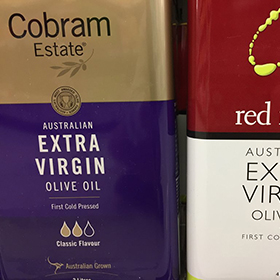
A liberal sprinkle of olive oil on your food may be good for your health and even slow down ageing. Many of the beneficial effects of olive oil on human health were originally thought to be the high concentrations of monounsaturated (omega 9) fatty acids, in particular oleic acid, was considered as the major healthful characteristic of virgin olive oil. Unlike saturated and omega 6 (vegetable oil) fats these don’t compete with the beneficial omega 3 fatty acids. However, more recent research has shone light on some of the minor ingredients particularly oleuropein (OL) and hydroxytyrosol (HT). There are more than 200 ‘minor components’ in the olive oil, which represent about 2% of the total weight. However, “extra virgin” olive oil, contains among the others, some peculiar antioxidant compounds which are not present in other oils and in other foods. These antioxidant compounds also contribute to the long oil shelf-life and influence characteristics including smell and taste (e.g. bitter, astringent, pungent, throat-catching) and color. Numerous benefits of these olive oil compounds have been shown with cardiovascular, metabolic and neurological diseases, cancer, weight loss and much more. Truly a health product to add to your daily meals.
When used with vegetables the oils increase the absorption of important antioxidants such as lycopene, the red colour found in tomatoes. When cooking tomato sauce the traditional way in olive oil the lycopene’s leaches out from the tomatoes into the oil because it’s very fat soluble. Lycopene has many health benefits but is well know for its protection from prostate cancer.
Olive oils have been found to have particularly high levels of anti-oxidants and anti inflammatory compounds and regular consumption of extra virgin olive oils. The studies also show the more you consume the lower the oxidative stress and inflammation, the 2 leading causes of chronic illness. The most bioactive of these compounds are OL and HT. In particular, OL is abundant in high amounts in unprocessed olive leaves and fruit, while higher concentration of HT may be found in the fruit and in olive oil. You can also get olive leaf extract from the local health food shop.
OL and HT are particularly effective as they show many different types of antioxidant activity including stimulating a process called Nrf2 (pronounced Nerf 2) which increase our body’s own production of antioxidants right in the cells where they are really needed. This is one of the major reasons they are so beneficial for people with diabetes type 2.
One of the more critical properties of these compounds is that they help prevent the formation of plaque in the arteries, known to cause heart disease or atherosclerosis. In particular, OL, in the average daily intake of olive oil or olive pieces of the Mediterranean diet, remarkably reduced (50% in average) LDL-cholesterol oxidation in fat rich meals (i.e. French fries) and increased the production of certain anti-oxidative enzymes (glutathione-related enzymes), preventing oxidation of LDL’s before plaque formation could occur in the artery. Studies in both rabbits and rats have also shown OL has multiple other cardio-protective effects to do with deterioration of the heart muscle (cardiomyopathy).
Numerous studies have now found a strong link of the anti-diabetic action with the antioxidant effects of OL particularly lowering of blood sugar (hypoglycemic). In human studies OL and HT have also been shown to improve insulin action and production in overweight middle-aged men at risk of developing metabolic syndrome a precursor to diabetes. This effect was comparable to that seen with drugs used to treat diabetes and much more platable.
Large population based studies have reported that uptake of olive oil is associated with a reduced risk of cancer in different organs. In a study of 13,800 people high olive oil consumption was associated with a 36% lower risk of developing breast cancer and a 30% lower risk of developing cancer of the digestive system. Among other studies, OL has been shown to inhibit tumor growth and spreading human breast cancer in mice studies.
HT, OL and some of the other derivatives have also been shown to be effective in age-related disorders such as neurodegenerative diseases including Alzheimer’s disease. Supplementation with an olive extract decreased pain and inflammation, and improved the quality of life of people suffering from arthritis. In addition, other studies have shown to lower inflammation-induced bone loss (osteopenia) in rats and found that bone loss was reduced as a result of supplementation. HT has also been shown to protect against age-associated macular degeneration (AMD) which is the leading cause of legal blindness for people over 55 years of age in the Western world.
So it is time we changed our main oils over to olive oil and consumed more of it every day. Unfortunately, much of the so-called olive oil sold in stores today is not actually olive oil, but rather a deceptive blend of inferior oils that may or may not include traces of actual olive oil. Both overseas consumer reports and studies have shown as much as 50 percent or more of all the olive oil sold commercially does not pass the stringent testing standards used to qualify the authenticity of real olive oil. A good reason to buy local extra virgin olive oil.
Some olive oil hints